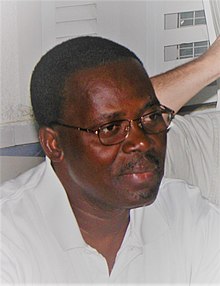|
André Nzapayeké
André Nzapayeké (born 20 August 1951)[2] is a Central African politician and banker who served as Acting Prime Minister of the Central African Republic from 25 January 2014 to 10 August 2014.[3][4] Early careerNzapayeké was born on 20 August 1951 in Bangassou, French Equatorial Africa.[2] The son of a pastor who also worked as a trader, he was a bright student who received a scholarship to study social anthropology at the University of Amsterdam.[5] Nzapayeké worked in Central Africa in the development sector, studying many villages of the country. Later, he worked as a consultant, and also taught at the University. In the early 1990s, he was in the Security Council of the Government.[2] He was briefly Minister of Rural Development under André Kolingba.[5] A technocrat, Nzapayeké rose to secretary-general of the African Development Bank and vice president of the Development Bank of Central African States from 2010 to 2012.[2][6] Within the Development Bank, he worked on the implementation of the peace agreements between the various parties during the conflict in Sudan.[2] He also had a job at the World Bank.[7] He is a Christian.[8] Political careerHe was appointed as Prime Minister in January 2014 during the 2012–14 conflict. His appointment followed that of President Catherine Samba-Panza and the resignation of Nicolas Tiangaye. Samba-Panza nominated him for the office, and he too was tasked with leading the country to the 2015 election.[6] Nzapayeké was little-known in the Central African Republic at the time of his appointment.[5] He said his first priority would be to stop the massacres and other atrocities within the country for months as the key step to restoring the writ of the state and then help the one million displaced persons.[6]
State radio announced Nzapayeké's resignation on 5 August 2014.[3] The reason for his resignation was the breakdown in peace talks in Brazzaville.[9] He was replaced by Mahamat Kamoun.[10] Since June 2015 he is ambassador of the Central African Republic in Southern Africa, since October 2016 also in New Zealand and since May 2017 in the Seychelles. References
Wikimedia Commons has media related to André Nzapayeké. Information related to André Nzapayeké |
||||||||||||||||||||||||||||

